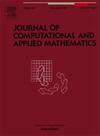Dispersion analysis of SPH for parabolic equations: High-order kernels against tensile instability
IF 2.6
2区 数学
Q1 MATHEMATICS, APPLIED
Journal of Computational and Applied Mathematics
Pub Date : 2024-10-10
DOI:10.1016/j.cam.2024.116316
引用次数: 0
Abstract
The Smoothed Particle Hydrodynamics (SPH) is a meshless particle-based method mainly used to solve dynamical problems for partial differential equations (PDE). By means of dispersion analysis we investigated four classical SPH-discretizations of parabolic PDE differing by the approximation of Laplacian.
We derived approximate dispersion relations (ADR) for considered SPH-approximations of the Burgers equation. We demonstrated how the analysis of the ADR allows both studying the approximation and stability of numerical scheme and explaining the features of the method that are known from practice, but are counter-intuitive from the theoretical point of view.
By means of the mathematical analysis of ADR, the phenomenon of conditional approximation of some schemes under consideration is shown. Moreover, we pioneered in obtaining the necessary condition for the stability of the SPH-approximation of parabolic equations in terms of the Fredholm integral operator applied to the function defined by the kernel of the SPH method. Using this condition, we revealed that passing from the classical second-order kernels to high-order kernels for some schemes leads to the appearance of tensile (short-wave) instability. Among the schemes under consideration, we found the one, for which the necessary condition for the stability of short waves is satisfied both for classical and high-order kernels. The fourth order of approximation in space of this scheme is shown theoretically and confirmed in practice.
抛物线方程 SPH 的分散分析:防止拉伸不稳定性的高阶核
平滑粒子流体力学(SPH)是一种基于无网格粒子的方法,主要用于解决偏微分方程(PDE)的动力学问题。通过频散分析,我们研究了抛物型 PDE 的四种经典 SPH 具体化方法,它们因拉普拉斯近似值的不同而有所区别。通过对 ADR 的数学分析,我们展示了所考虑的某些方案的条件逼近现象。此外,我们还率先从应用于由 SPH 方法核定义的函数的弗雷德霍姆积分算子的角度,获得了抛物线方程 SPH 近似稳定性的必要条件。利用这一条件,我们发现某些方案从经典的二阶核到高阶核会导致出现拉伸(短波)不稳定性。在所考虑的方案中,我们发现了一种方案,其经典和高阶内核均满足短波稳定性的必要条件。该方案在空间上的四阶近似在理论上得到了证明,并在实践中得到了证实。
本文章由计算机程序翻译,如有差异,请以英文原文为准。
求助全文
约1分钟内获得全文
求助全文
来源期刊
CiteScore
5.40
自引率
4.20%
发文量
437
审稿时长
3.0 months
期刊介绍:
The Journal of Computational and Applied Mathematics publishes original papers of high scientific value in all areas of computational and applied mathematics. The main interest of the Journal is in papers that describe and analyze new computational techniques for solving scientific or engineering problems. Also the improved analysis, including the effectiveness and applicability, of existing methods and algorithms is of importance. The computational efficiency (e.g. the convergence, stability, accuracy, ...) should be proved and illustrated by nontrivial numerical examples. Papers describing only variants of existing methods, without adding significant new computational properties are not of interest.
The audience consists of: applied mathematicians, numerical analysts, computational scientists and engineers.

 求助内容:
求助内容: 应助结果提醒方式:
应助结果提醒方式:


